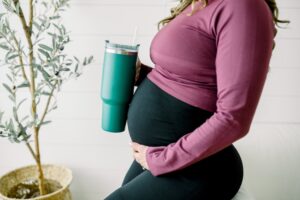At Fitbliss Fitness we are committed to providing you with accurate and insightful information to support your journey through pregnancy while maintaining your fitness goals. In this issue of Facts with Nat, we are delving into a topic that often sparks questions and concerns: the use of creatine during pregnancy. As a vital supplement in the fitness world, creatine’s safety during this transformative phase has been the subject of much discussion. Join us as we explore the facts, dispel myths, and offer guidance on making informed choices to prioritize both your health and the well-being of your growing baby.
Natalie: This is an excellent question. And while we cannot definitively state that creatine is safe to consume during pregnancy, we have some potentially promising research underway. Please review this outline for relevant information and let me know if you have any follow-up questions.
 Creatine:
Creatine:
Our most recent continuing education modules taught us that creatine is a naturally occurring compound that plays a crucial role in cellular bioenergetics, particularly in skeletal muscle.
Creatine supplementation is considered safe in female populations. While we don’t have research on pregnant populations yet, it is beneficial to review the available literature (specifically from Guingand et al., 2020)
- This study is a systematic review that investigated the safety of creatine monohydrate supplementation in females.
- The review included 58 studies with 951 female participants who were given creatine, and adverse outcomes were monitored.
- The review found no deaths or serious adverse outcomes associated with female creatine supplementation.
- Additionally, there were no significant differences in total adverse events, gastrointestinal events, or weight gain in females supplemented with creatine when compared to the placebo group.
- The study’s findings are significant because they contribute to the existing body of research on the safety of creatine supplementation, especially in female populations.
Summary of key findings:
- No Mortality or Serious Adverse Events: The study found no deaths or serious adverse events associated with Creatine supplementation in females. This finding is consistent with previous safety reviews in male or mixed-sex populations.
- Gastrointestinal Events: The most commonly reported adverse events were related to the gastrointestinal system, such as nausea, vomiting, and bloating. However, these events were not significantly different between the Creatine and placebo groups.
- Renal and Hepatic Function: The review analyzed renal and hepatic function measures and found no statistically significant differences between the Creatine and placebo groups. This indicates that Creatine supplementation did not adversely affect the kidneys or liver in females.
- Body Weight: There was no significant change in body weight between the Creatine and placebo groups, indicating that Creatine supplementation did not cause weight gain in females.
- Overall, this is an excellent study, and the results provide evidence supporting the safety of Creatine supplementation in females. The absence of mortality and serious adverse events, along with no significant differences in adverse outcomes, weight gain, or renal and hepatic complications, suggests that Creatine is well-tolerated in female populations. Overall, Creatine appears to be safe for females when taken in recommended doses.
Creatine during pregnancy:
Human research on creatine supplementation during pregnancy is still limited, but here is what we do know.
- As pregnancy progresses and the fetus grows, maternal metabolism undergoes significant adaptations to meet the changing metabolic demands of advancing gestation. One essential aspect of cellular bioenergetics during reproduction is creatine metabolism.
- Changes in Maternal Creatine Homeostasis
- Studies in pregnant spiny mice and humans have shown changes in maternal creatine homeostasis during pregnancy. In spiny mice, maternal plasma creatine concentrations decrease progressively from mid to late gestation, and urinary excretion of creatine also decreases during this period. However, creatine transporter expression increases in maternal tissues with high-energy demand, ensuring adequate creatine availability for maternal tissues.
- Similarly, in humans, plasma creatine levels remain low but stable throughout gestation, while urinary creatine excretion increases threefold, particularly in the third trimester, indicating an increased demand for creatine due to fetal growth and metabolic requirements.
- Associations with Maternal Characteristics and Fetal Growth
- Studies have identified associations between maternal characteristics and circulating and excreted creatine levels during pregnancy.
- Maternal urinary creatine excretion is correlated with birth weight centile and birth length, suggesting a relationship between maternal creatine status and fetal growth.
- A reduction in maternal serum creatine concentration during the third trimester has been associated with a greater incidence of poor perinatal outcomes, including small for gestational age, preterm birth, and neonatal intensive care admission.
- A case study of a pregnant woman with an AGAT deficiency demonstrated the importance of dietary creatine supplementation during pregnancy to support fetal growth and development.
- Creatine Supplementation in Pregnancy
- Preclinical and observational clinical studies indicate that creatine may be an essential metabolite during pregnancy and that adequate creatine levels during pregnancy may be critical for optimal fetal growth and survival.
- Animal studies suggest that creatine supplementation during pregnancy enhances neuronal cell uptake of creatine and supports mitochondrial integrity, reducing brain injury induced by intrapartum asphyxia.
- However, human research on creatine supplementation during pregnancy is still limited, and caution is advised until more evidence is available.
- Ongoing Research and Safety Considerations
- An ongoing prospective longitudinal cohort study aims to shed more light on the role of creatine metabolism and supplementation during pregnancy. While we do not currently have human studies on creatine supplementation during pregnancy, it could be a safe and cost-effective strategy to reduce pregnancy complications associated with cellular energy depletion.
- The completion date will be the end of the year 2023.

Other points of interest:
Evidence suggests that augmenting fetal creatine levels through maternal dietary supplements before birth could potentially mitigate injury to the baby in cases of labor complications that lead to reduced oxygen delivery to the unborn child.
Considering that creatine is naturally present in our diet and can be derived from animal products and produced by the body itself, it is reasonable to speculate that creatine is highly tolerated in pregnant populations.
Conclusion:
-
- Creatine supplementation during pregnancy is a topic of growing interest and importance.
- While animal studies show promising results for creatine supplementation, more research is needed in human populations to understand its potential benefits and safety fully.
- Pregnant women and individuals with pre-existing medical conditions should consult with their healthcare providers before considering any dietary supplement, including creatine, during pregnancy or at any other time.
- It is essential to follow recommended dosing regimens and use supplements under the guidance of qualified healthcare professionals to ensure safety and optimize potential benefits.
When the study is posted this year, we will be sure to share it here on our blog!
References
Cannata, D. J., Ireland, Z., Dickinson, H., Snow, R. J., Russell, A. P., West, J. M., & Walker, D. W. (2010). Maternal creatine supplementation from mid-pregnancy protects the diaphragm of the newborn spiny mouse from intrapartum hypoxia-induced damage. Pediatric Research, 68(5), 393–398. https://doi.org/10.1203/PDR.0b013e3181f1c048
De Guingand, D. L., Ellery, S. J., Davies-Tuck, M. L., & Dickinson, H. (2019). Creatine and pregnancy outcomes, a prospective cohort study in low-risk pregnant women: study protocol. BMJ Open, 9(1), e026756. https://doi.org/10.1136/bmjopen-2018-026756
Dickinson, H., Ellery, S., Ireland, Z., LaRosa, D., Snow, R., & Walker, D. W. (2014). Creatine supplementation during pregnancy: summary of experimental studies suggesting a treatment to improve fetal and neonatal morbidity and reduce mortality in high-risk human pregnancy. BMC Pregnancy and Childbirth, 14(1). https://doi.org/10.1186/1471-2393-14-150
Guingand, D., Palmer, K., Snow, R., Davies-Tuck, M., & Ellery, S. (2020). Risk of Adverse Outcomes in Females Taking Oral Creatine Monohydrate: A Systematic Review and Meta-Analysis. Nutrients, 12. https://doi.org/10.3390/nu12061780.
Muccini, A. M., Tran, N. T., de Guingand, D. L., Philip, M., Della Gatta, P. A., Galinsky, R., Sherman, L. S., Kelleher, M. A., Palmer, K. R., Berry, M. J., Walker, D. W., Snow, R. J., & Ellery, S. J. (2021). Creatine metabolism in female reproduction, pregnancy and newborn health. Nutrients, 13(2), 490. https://doi.org/10.3390/nu13020490
Smith-Ryan, A. E., Cabre, H. E., Eckerson, J. M., & Candow, D. G. (2021). Creatine supplementation in women’s health: A lifespan perspective. Nutrients, 13(3), 877. https://doi.org/10.3390/nu13030877

Leave a Comment